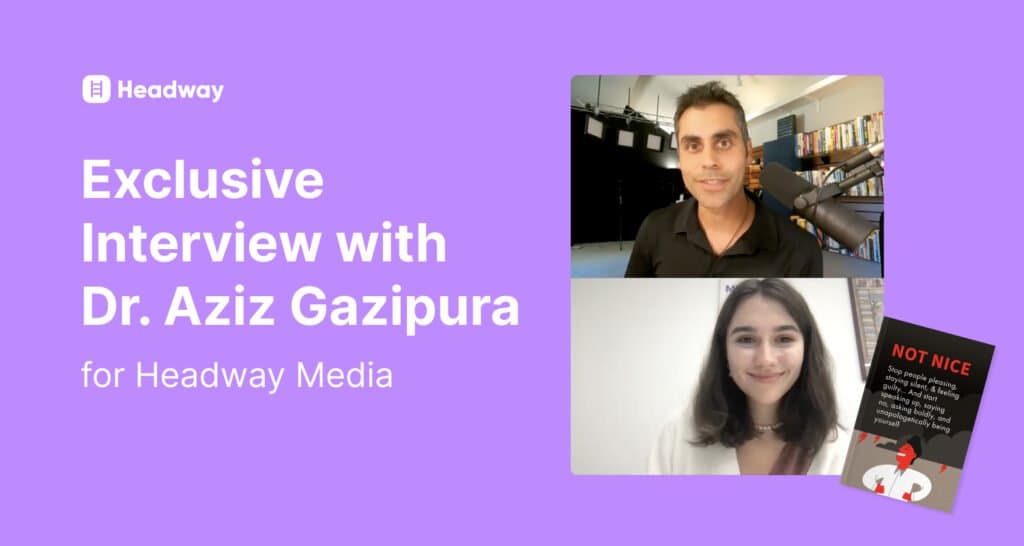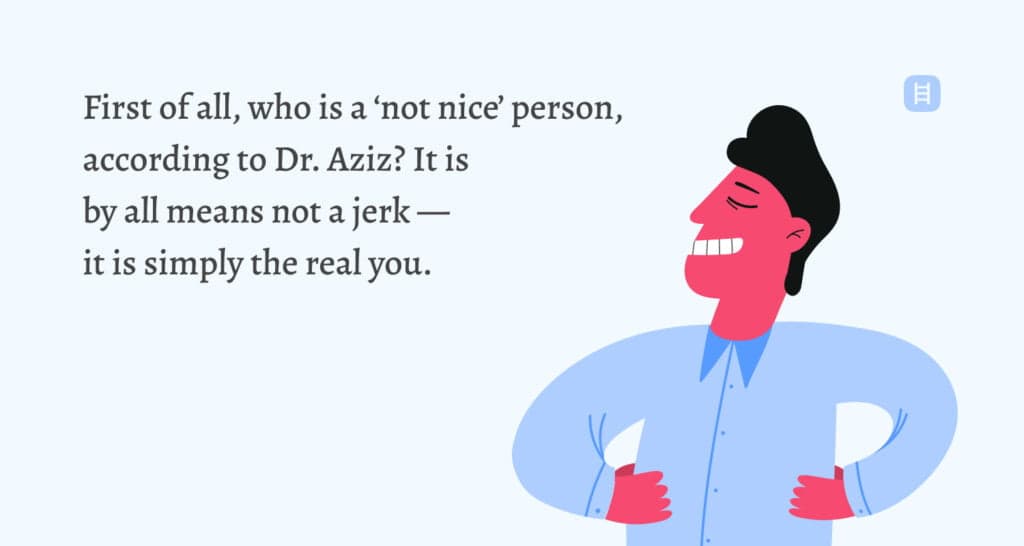How to gain confidence? How to set personal boundaries? And how to finally put a stop to the people-pleasing habit? However complicated these questions might be, it is Dr. Aziz Gazipura who knows all the answers.
Being one of the world’s leading confidence experts, Dr. Aziz is also a clinical psychologist and a bestselling author. Even though all his books are undoubtedly worthwhile, one particular title really struck a chord with us. So prepare and beware, for it is the Not Nice — the ultimate handbook to ‘stop people-pleasing, staying silent, and feeling guilty.’
Of course, only reading Not Nice was not enough for us — we craved more of Dr. Aziz’s wit and advice. So we went further and held an exclusive interview with him for Headway Media!
In this article, you will learn about his struggles with gaining confidence, tips on setting personal boundaries, not getting manipulated, raising assertive kids, and so much more. Also, make sure to check out the summary of Not Nice on the Headway app beforehand to get more context.
And now, without any further ado, let’s get to it!

Story of Dr. Aziz Gazipura
A doctorate in clinical psychology, a successful group program, several self-help bestsellers… But before accomplishing so many great things, Dr. Aziz has had his share of confidence issues. As the author said, he was afraid even to come up and introduce himself to a girl, let alone converse or flirt with her. At some point, young Dr. Aziz Gazipura decided to get rid of his social fears and began researching the topic. It was initially a motivation to help himself, but he realized that others could benefit from such guidance, too. And that is when his professional journey as a psychologist started.
His success was not linear, as it never is: Dr. Aziz confessed to having experienced loads of self-doubt. The incessant voice kept telling him he wouldn’t be able to help people; it would not be useful; if he wrote a book, no one would read it; if he offered a workshop, no one would come to it. But Dr. Aziz knew better than to give in to this discouraging self-talk.
‘If you’re waiting for doubt to lessen before you take action, you will be waiting until you die. And probably not have lived the life you want to live. We need to learn how to act despite doubt and do what scares us until fear has no power to stop us. Once I’ve started practicing that more and teaching that more, I had to do it more. Because you want to stay consistent with what you’re putting out there. I continually looked for opportunities where doubt says I can’t do something that feels meaningful for me, and I set out to do it. Whether it’s a 1-month goal or a 5-year goal, I keep proving doubt wrong.’
Dr. Aziz Gazipura
And even now, despite being highly successful in what he does, Dr. Aziz is still frequented by self-doubt visits. However, he reminds himself to keep going and challenge his capabilities to the limit.
But how does a clinical psychologist decide to become an author as well? To find out, read the next part of the interview, where we unveil Dr. Aziz’s writing career background.
The Inspiration behind Not Nice
Besides being interested in overcoming excessive niceness himself, it was also Dr. Aziz’s practice that encouraged him to write Not Nice:
‘I wanted to explain so much more than I could have in sessions. I needed to write a book that would address the issue fully and comprehensively. So someone could read it, understand what niceness is, break free of it, and have the tools to do so. And I created it for my clients to read as we work together, and it turned out that other people needed it as well.’
Dr. Aziz Gazipura
And what does the bestselling author read himself? Books are an integral part of Dr. Aziz’s self-growth journey indeed. As the most influential for his practice, he highlighted Compassion and Self-Hate by Theodor Rubin and the works of Stephen Levine.
Now that we know what stands behind the creation of Not Nice let’s dig more into applying this book’s wisdom to everyday life.
Becoming ‘not nice’ and gaining confidence
First of all, who is a ‘not nice’ person, according to Dr. Aziz? It is by all means not a jerk — it is simply the real you. Authentic, honest, and somewhat inconvenient. Able to ask for what you want, say no, end a toxic relationship and be direct. Doesn’t seem possible? Well, it is. But not without difficulties on the way.

‘You can still be kind, good-hearted, contribution-oriented by being less nice. That’s what I want to be. People get confused, thinking they can’t be kind anymore. For instance, kindness is genuinely giving to support or contribute to another person from a place of choice. Niceness is a compulsion — ‘I have to do this.’ We want to be able to choose kindness, and the choice only occurs when you can say no. Otherwise, it’s not a choice. So when you develop the capacity to say yes and no, you start to craft a new identity in the world’.
Dr. Aziz Gazipura
As the author confessed, sometimes people misinterpret the message of Not Nice and criticize it as a manual for being rude to others. But Dr. Aziz doesn’t see it as a problem — after all, the book is not for everyone. And he concluded that it is quite liberating not to need everyone to be on board with you.
Also, Dr. Aziz couldn’t stress enough that it’s being authentic that scares some people. Because becoming the real you leads to a significant change in life and may cause some relationships to crumble. And it is these aftereffects that frighten people and hinder their liberation from excessive niceness.
When we asked Dr. Aziz about the hardest part of becoming ‘not nice,’ he said that it was feeling the internal backlash after doing the ‘not nice’ things. Typically for people, it’s guilt, fear, and shame. In this case, it’s essential to reclaim your reality and start living by your own rules_._ That means eradicating the ‘nice’ laws that you used to adhere to without a doubt. It goes from ‘never say no to people’ to ‘always agree with your mother,’ and it’s necessary to get them out of your system.

It would be additionally helpful to have a supportive community that will encourage you to speak up for yourself. Although unfortunately, it’s most often your close ones who resist your change, says Dr. Aziz. Therefore, you might experience some pushback at first, but the relationships worth preserving will adapt with time. And those depending on you being convenient and playing a certain role will dissolve.
Another common concern in this area is what if those unhealthy relationships are with your family members? Dr. Aziz realizes that cutting them off is not always an option, so he suggests staying in contact with them, but not with the same frequency level.
Ultimately, remember that you are not the only possible source of help for other people.

Debunking popular confidence advice
We also wanted to hear Dr. Aziz’s take on popular yet ineffective confidence advice, considering that he’s an expert in the field. The first one to cross his mind was ‘Just be more confident,’ which may come from a good heart but is neither useful nor applicable. Another tip the author outlined was the good old ‘Just be yourself,’ which holds some truth but is unsuitable for people with social anxiety.
‘When someone has social anxiety, they have a belief there’s something wrong with them. Therefore, socially anxious people predict rejection, imagine it worse as it is. And they don’t think that if someone doesn’t like them, someone else will. They feel like ‘if they don’t like me, this means I’m generally unlikeable, and now I’m under threat of isolation. That’s like telling someone who has developed a neural pathway due to trauma, where they’re afraid of a certain kind of stimulus, ‘Just do the thing.’ I’m not saying that this person is stuck forever; they simply need something more nuanced.’
Dr. Aziz Gazipura
Another common though a not helpful piece of advice that Dr. Aziz pinpointed was ‘Fake it till you make it.’ According to him, it’s too vague. Because what should you be faking? Being more outgoing when it’s not what you want? Or acting like things don’t bother you when they clearly do? Even though confidence is a byproduct of action, there still is a better way to get assertive without needing to pretend and lie, says the author.
Instead, Dr. Aziz suggested his approach for gaining confidence, The Approval Assumption. To practice it, you should think first of someone who naturally approves of you. Of course, you can have arguments here and there, but overall you feel at ease around them. Then you should tune in to how you behave around this person. And that is the version of yourself you want to practice being around other people. The bottom line is that there will be no faking, being authentic only.

Raising Confident Children
When we asked Dr. Aziz about his most significant achievements, he didn’t hesitate with the answer. It was, first of all, creating life with his wife and children. So, naturally, we wondered about his ways of raising kids, especially in terms of teaching them to be confident and assertive:
‘One is for the parents to focus on their growth. There’s a quote by Gabor Maté that says, ‘Children swim in their parents’ unconscious like fish swim in the sea.’ Your children are heavily impacted and influenced by you in so many ways — how you carry yourself, the emotional state you tend to be in, how you perceive the world. You may say, ‘You can do it, son!’, but if your energy is not modeling that, then they’re going to get the other message.’
Dr. Aziz Gazipura
Another important point that Dr. Aziz underlined was the necessity to expose your children to the real world. It is crucial to encourage kids to do what scares them since it will make them stronger individuals. In this respect, patience is critical, and parents should not succumb to the desire to do everything for their youngsters to get it over with faster. Also, you can gamify this process to keep them engaged. For example, Dr. Aziz gives his children Bravery Points for facing their fears, which motivates them to do so more.

Future Plans
In one of his recent YouTube videos, Dr. Aziz has mentioned a new book coming out — The Hundred Wins in The Hundred Days. So we decided to tap into that more and find out all the details.
As the author explained, it will be “a simple game to supercharge your confidence in just 30 seconds per day.” A win is either something that went your way or the fact that you took a risk, no matter the outcome.
The book’s purpose is to change the habitual focus of the brain to concentrate on what went well instead of a constant threat mode. Dr. Aziz claimed to have been practicing this method himself and found it highly beneficial.
For everyone else willing to retrain their brain, the book will be available by the end of November 2021. So buckle up for the next huge Dr. Aziz’s bestseller, which promises to be a big hit!
The Headway Media team is highly grateful to Dr. Aziz Gazipura for his time and captivating interview.




